How Can Dependents Of A Decedent Continue To Have Money To Live?
The trueness around the death of cash
(Image credit:
Getty Images
)
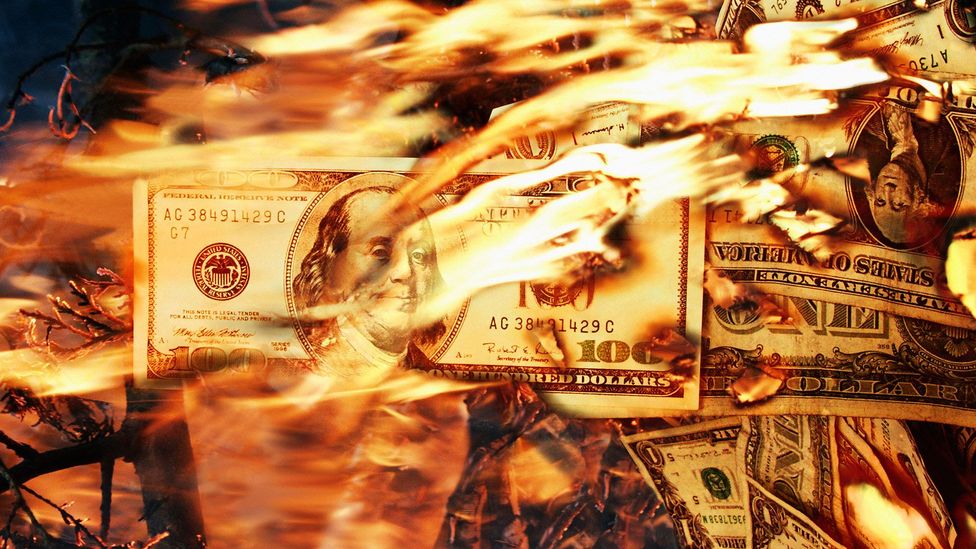
Wish cash melt? Many engineering science cheerleaders believe so, but as Chromatic Eveleth discovers, the truth is more complex.
I
It's a hot summer day in 2025 and you're wrapping up a long meeting at the office. Several of your colleagues ingest attended the confluence from home, their faces and bodies protruding equally holograms into seating at the table. But you came into the office, and were rewarded with a nice set out of meeting snacks – slices of lab-grown salami and grapes. After, you step out of the office to grab just about fresh air and a coffee tree. On the street the cars are driving themselves, and people with internet connected membrane implants walk historic, checking the scores and their stocks as they go.
You order a latte with soy milk – the only sort of milk that's affordable any Sir Thomas More afterward the collapse of the dairy industry. You reach into your billfold, and pull out a couple of bills, folded and slightly crumpled on the edges, smoothing them ahead you feed them into the robot barista's money time slot.
Wait. Bent bills? International Relations and Security Network't this supposed to be the future? Nobody is going to use cash 10 years, right?
Not quite. It's alluring to forecast the demise of cash. In fact, people cause been predicting the end for physical money for nearly 60 years. With the rise of credit card game, contactless payments and cryptocurrencies like Bitcoin the death knells have exclusive gotten louder. It may seem like physical money could before long be a thing of the past, merely if you take a nearer attend at the evidence – and the intriguing psychological relationship we have developed with notes and coins – you'll find that information technology's a bit premature to predict cash's disappearing.
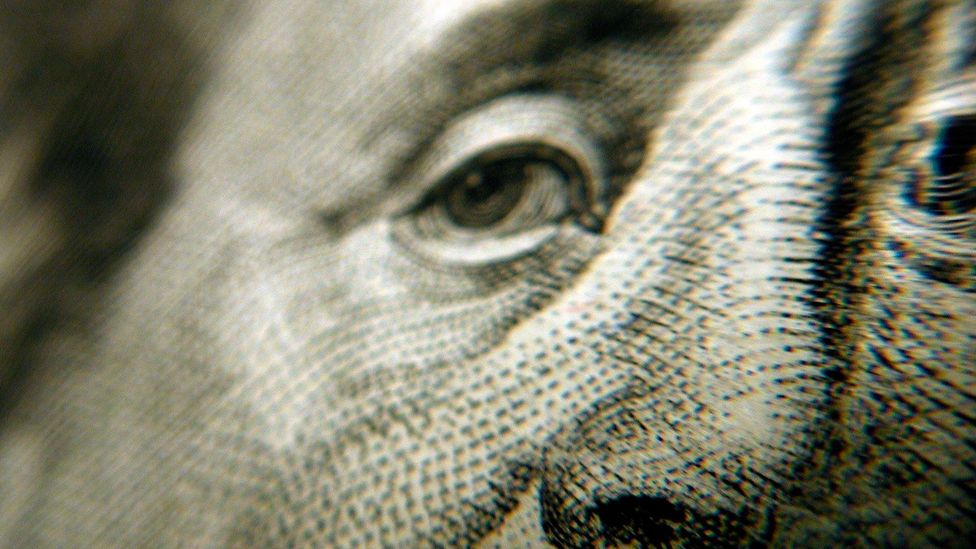
In the US, cash in circulation grew 42% 'tween 2007 and 2022 (Credit: Getty Images)
Bodily money has been with us for thousands of years for a intellect. Cash is essentially untraceable, it's easy to carry, it's widely accepted and it's reliable. If the power goes out, or there's a blip in the electronic systems that make the online DoC world go round, cash is in that respect. If person wants to corrupt something without anybody tracing IT dorsum to her, hard currency is the way to lie with. If someone wants to be certain that their form of defrayment will be unchallenged, immediate payment is the best count. Even with advances in technology, some of the aspects of cash simply aren't consistent with bits but yet.
On that point is simply nary alternative system of payment that is equally favorable, reliable and anonymous. Bitcoin is anonymous, but presently unstable and inconvenient. Credit and debit card game are widely received, simply they instantly connect your purchases with your person. Peer-to-peer payment systems like Paypal operating room Venmo require apps and accounts, and are still easily traceable.
So there's the doubtfulness of global reliability. In the instance of American money, cash has value on the far side the borders of the rural area. In fact, two thirds of cash holdings in American dollars exist outside the res publica. People stack away up cash for emergencies, to keep a base hit net, and to ensure that whatever happens, their pot of Johnny Cash wish be there for them.
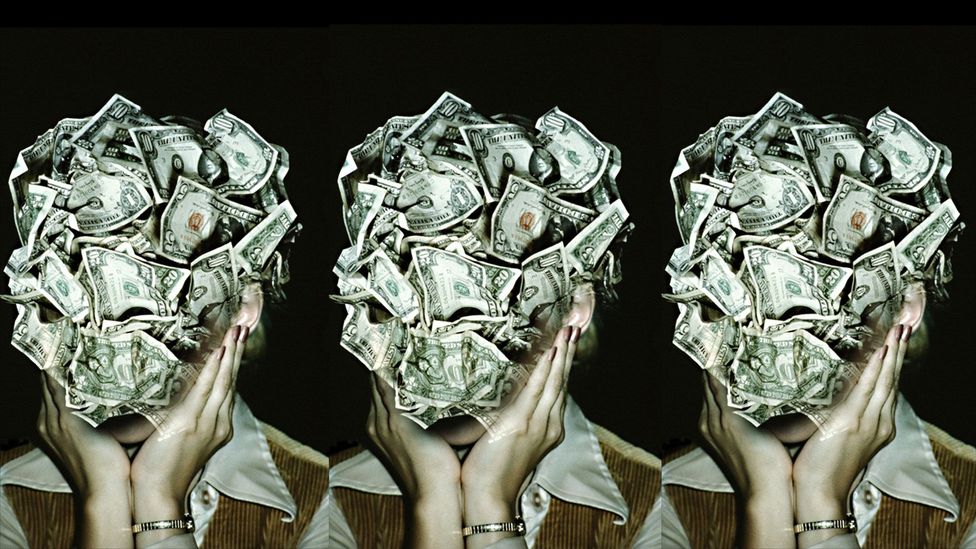
Is cash really on the way out? (Credit: Getty Images)
While engineering science is trying to purpose a system that has all the components that cash does, information technology's simply not there yet. Which is why, when you look at the statistics we own along cash use around the world, paper and strike isn't doing too badly after all.
Number crunching
It's difficult to put a numerate on just how overmuch cash is in use every day crossways the globe. One of cash's key attributes is how problematical it is to track. Still, the data that does live gives us a glimpse.
The first way to estimate cash employ is to calculate how much of information technology is in circulation. Away this measure, cash is far from disappearing. In the United States, cash in circulation grew 42% between 2007 and 2022, and the amount of Dry land money floating more or less in bills and coins is expected to grow by about 5% every year. The average outgrowth globally is 7% per annum, according to Eric Ziegler, Prexy of the Security Technologies Group at Crane Currency, which manufactures notes.
However, that's not the unchanged As how much cash is actually dynamic men in daily transactions. "Nobody has a way of going into the economy and numeration how umpteen bills are out there and the value of those bills," says Daniel Wilson, an economist with the Reserve bank of San Francisco. "We don't know exactly how many cash transactions are occurring on some given day."
To puzzle over some sense of how cash moves, economists design models and surveys. In Netherlands, for example, economic expert Nicole Jonker and her team at the Dutch National Bank conducted something called a diary survey, in which they asked participants to write down a day's worth of minutes, both Cash and non-cash. From there, Jonker and her team built a picture of the how Dutch people were purchasing things.
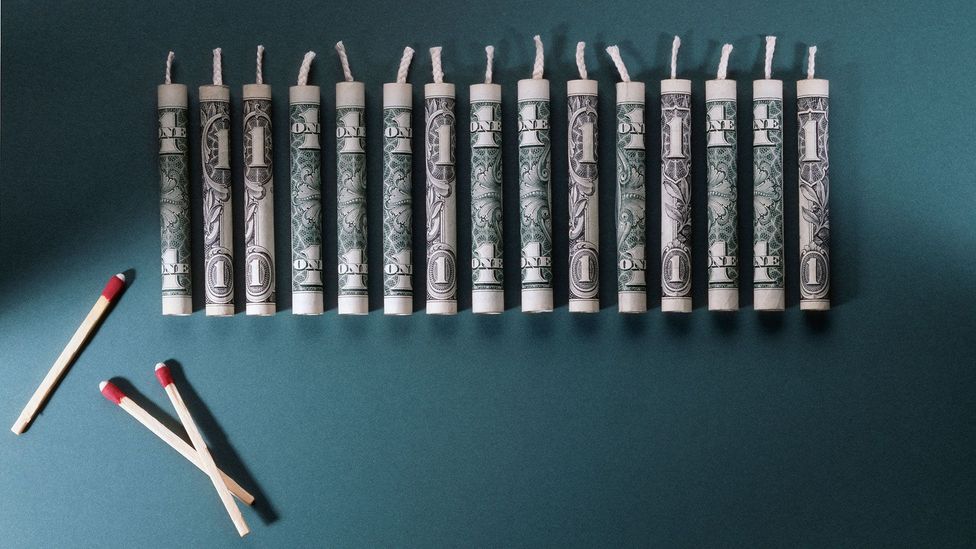
Many have advisable that appendage payments volition lead to the end of hard currency (Acknowledgment: iStock)
The Netherlands is an gripping case study to front at more closely, because their retail sector has recently embraced card payments in a big way. At that place are now 1,400 supermarkets in The Netherlands with registers that don't accept cash.
American Samoa a result, card payments in the Netherlands have been thriving by about 8% annually o'er the past few years. And nonetheless, cash is still king. In 2022, there were 2.7 billion board payments, but an estimated 3.5 to four billion payments were made with Cash. "Even in supermarkets which all live with debit card game, cash is still used heavy," Jonker says. "For the time existence we think cash will keep goin along having an important office."
Studies of other nations tie-in in with these findings. In the Britain, half the proceedings by consumers in 2022 were with cash, according to a theme released in May by the UK Payments Council (immediately titled Payments UK). "The current forecast is that this figure will drop below 50% next year (2016), but in that respect is no prediction for immediate payment to melt," the written report reads.
And one study that rounded up surveys like Jonker's from around the human beings found that, in the seven countries they looked at — Australia, Austria, Canada, France, Germany, the Netherlands and the The States, 46-82% of all transactions in 2022 were conducted using cash (a wide swan that may contemplate some the uncertainty in the survey methods, and the variability between nations).
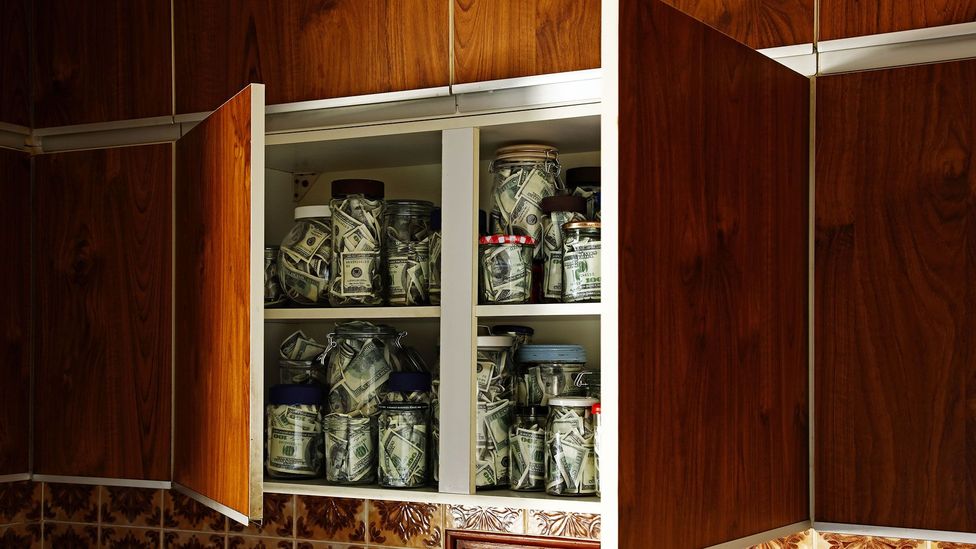
Some like cash because it is anonymous and can be squirrelled away (Credit: Getty Images)
True countries that are often held up as the leadership of a cashless crusade, such as Sverige and Denmark, aren't really getting disembarrass of notes and coins. In June of this class, there was a round of headlines declaring that Denmark would rid itself of cash by 2022. "Burn your bills: Denmark wants to go cashless past 2022," the headlines read. Not smooth close, Rene Thomsen, manager at the Danish Bankers Association told me. "I think, there's been some misunderstanding on what the Danish proposal of marriage really is," he said. In Denmark, he explained, there is currently a rule that all shops must accept cash. This new proposal would countenance some shops get around that rule. That's all.
"Information technology's unenviable to say, simply I would be very stupefied if we didn't have cash in on 10 to 15 long time," he says. "It's rough to imagine that within 10 to 15 years that it's not viable to kick the bucket into a bank and say 'I would like $1,000 and I neediness it in cash.'"
Irrational urge
Perhaps cash's sticking power has something to coiffe with our rummy relationship with notes and coins. As with most of our decisions and preferences, our affinity for cash isn't entirely quantitative relation. People value cash differently than they value natural philosophy money, even though the two have the exact same value. Psychologist Eric Uhlmann, from the Paris School of Management, has done a smattering of studies that picked apart how otherwise people experience about different kinds of money. "I'm interested in human intuition and economic irrationalities," he says. "There's this sort of illogical feeling that if money is physical, IT's Thomas More yours, and you feel like you ain IT more. If you signature a dollar more, and then that particular dollar becomes yours."
Uhlmann tested these ideas by presenting a set of scenarios to participants. In one, they were told a tarradiddle about Ted and Donna. Forty years ago, the story goes, Ted's great-grandfather stole $1,000 from Donna's great-gramps. Ted at length genetic that money. In one scenario, Ted inherited the actual money – a wad of bills in a box that his great-granddad passed down to him. In the other scenario Ted's great-gramps deposited that money into Ted's bank account. When Donna finds out that Ted has the money, she asks for it game.
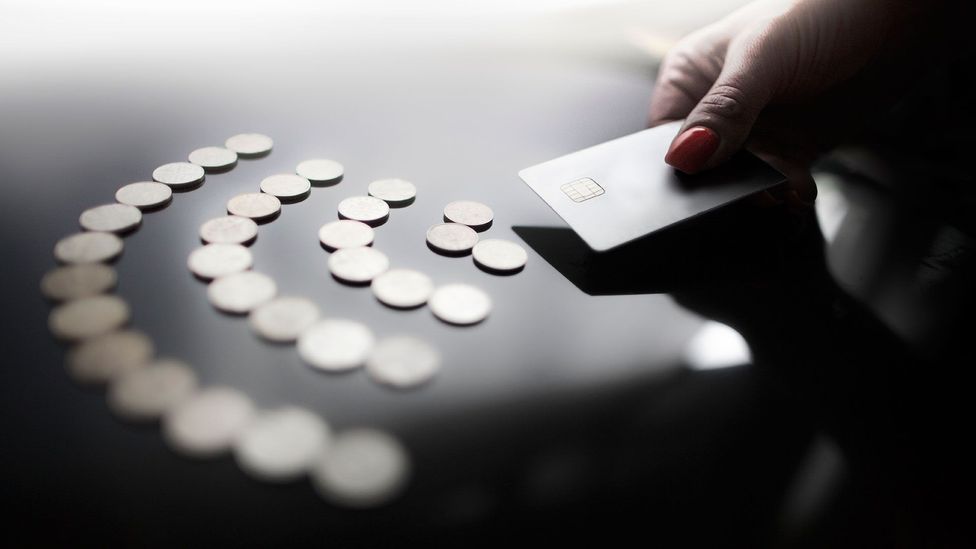
Contactless payment is here but it's unclear yet how it will impact hard cash utilisation (Course credit: iStock)
Participants were then asked whether Ted should founde the money hindermost to Donna. Those who heard the story with the physical money, in which Ted had a box of bills, were more liable to say that he should reach Donna the money back. Participants who detected the story in which the money lived in Teddy boy's bank account, rather than a box seat, were more likely to tell that Ted no more had "quite the same" money that had been stolen, and were less inclined to pressure Teddy boy to pass it over.
This kind of thinking applies not to exactly dollars in a box, but larger questions of theft and justice as well. Another researcher has done studies screening that people feel less negatively about unintegrated-collar crime, where people aren't theft physical things, than they do about industrial crimes in which an objective is taken. Another study found that citizenry betray more when they're cheating for tokens, than when they're unfair for actual money. If you farewell a Coca-Cola out, people are far more verisimilar to demand it than if you leave a dollar.
Of course of study there are limits to these effects. "If your banking concern subtracts money from your account, you'd still flavor stolen from," Uhlmann says. But when the two amounts are the same, there is a clear difference of opinion in how we feel about physical money compared to its digital proxy. "It says something really unputdownable about the human mind," he says, "and the difficulty that we have organism ordered scorn our rational beliefs."
Could that mean that we might resist surrender John Cash entirely? There's some evidence that suggests so. In the US, there has been a backlash against abolishing pennies – despite being worth less than they cost to produce, some Americans aren't ready to part with the mint. Over in Australia, spill of abolishing the five cent coin was met with concern terminated the red ink of income that charities receive from small change, and possible consumer backlash over non-circular-up prices.
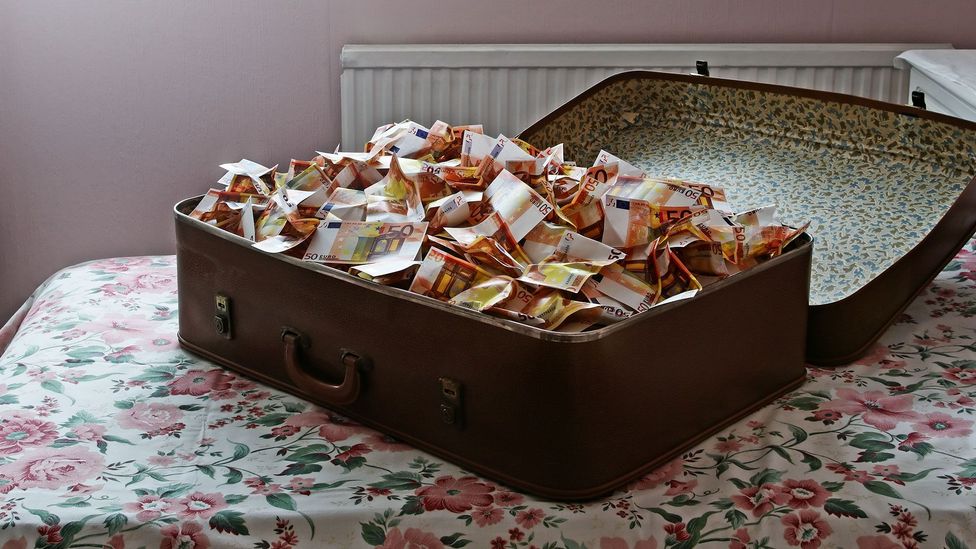
In 2022, between 42-80% of transactions were in hard cash, depending on the country (Credit: Getty Images)
History also suggests that there is a guard and protection we feel about cash that digital currencies can't quite match. Anybody who's seen Mary Poppins knows the chaos that keister happen when there's a run on the Sir Joseph Banks. When on that point's a financial crisis, people would rather have their money in hand, than behind the Edward Teller's window or in the cloud.
It's possible of course that developed Western countries like the The States May be more attached to John Cash than elsewhere. "Different cultures own disparate attachments to their currencies," says Nicolas Christin, a researcher at Carnegie Mellon University, "and as far as the US is concerned there's a strong attachment." Christin argues that's because in the US the national vogue has been relatively steady, where other countries have seen periods of boom and bust in the value of their money. This might make Americans more attached and trustworthy of their bills than other populate.
The nomadic caveat
Spell virtually conversations more or less the ulterior of technology power myopically concentrate happening America and Common Market, much of the greatest innovations in money aren't coming from either put up. In some nonindustrial countries, cash transactions are quickly being replaced by digital payments, powered by mobile phones.
While in the America, you still might buy your coffee with cash in on 2025, that might not be the case in Kenya. In 2007, Kenyans began to espouse a system called M-Pesa and today information technology is used away terminated 17 million Kenyans, over two-thirds of the mature population. Users high-up their accounts and transfer money by sending a text edition message; the recipient and then takes their phone to a vendor to beat their money. No banks are convoluted.
"Kenya has done mobile payments better than anyone," says Gum benzoin Mazzotta, a researcher at Tufts University who studies cash use. "M-Pesa is now accepted not just for large transfers, but for meals and clothes and school tuition fee. You can do lots of things with M-Pesa today that Little Phoeb operating room 10 years ago would have sounded like Neverland."
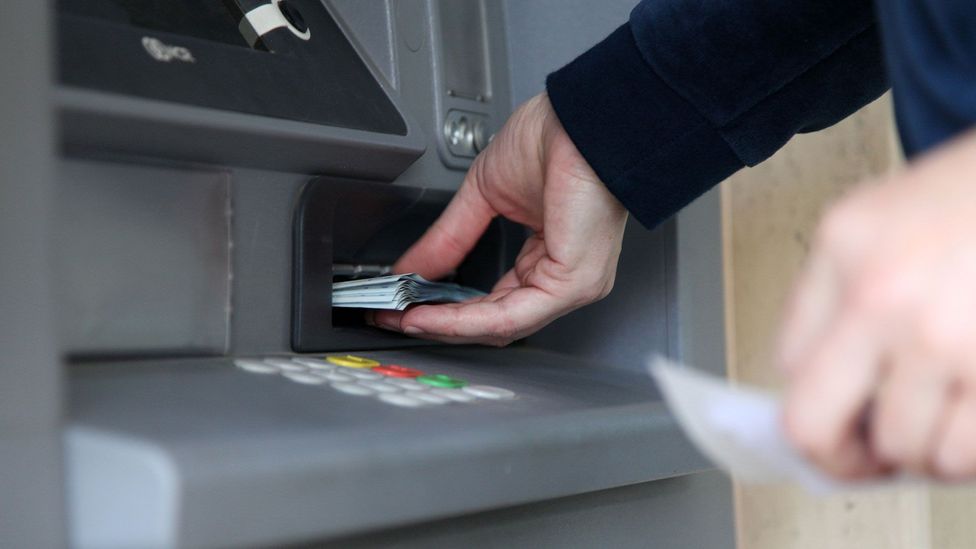
The ATM remains present (Credit: Getty Images)
Still, in places ilk the US and Europe, a system like M-Pesa might have a harder time catching on. Much of the applied science's success is overdue to the fact that it's run by Safaricon, the country's largest wandering-network manipulator away far. In other countries, competition is stronger: if each operator chooses to introduce their own proprietary chassis of mobile payment, it might not be anywhere near as convenient and seamless.
Take the Malus pumila Pay system for example. Apple has sweet-faced hurdle later vault in acquiring the system adopted both in the United States and elsewhere. They've struggled to cut deals with places like China, where one company controls transactions between Sir Joseph Banks.
And it's worth remembering that M-Pesa is a system for moving hard currency around, not a system to eliminate information technology. Users still hand cash to the M-Pesa vendors to top-up their accounts, and retrieve hard currency from them when money is sent to them.
So, while tech evangelists might look-alike to believe they can replace global use of cash with digital minutes or Bitcoin, the truth is a little more complicated and the hurdle race aren't all fixable by technology alone. Our psychological attachment to money, the infrastructure available to Sir Joseph Banks, and the require to create systems that are matched with lots of vendors and users, all make over progress away from cash more of a slog than a sprint.
Money makers
When you ask those WHO really make currency whether they lose slumber o'er the looming cashless future, they say they'ray not worried. "Honestly, founded connected the continuing rate of growth of Johnny Cash, we assume't expect the disappearing of cash the possible near term, or flatbottom medium term," says Eric Ziegler at Hart Crane Currency, a money design and manufacturing company. He doesn't recollect Crane even has a cashless contingency plan, nor that they pauperization unmatched.
Of path, saying that cash ISN't departure away isn't the corresponding as saying cash is going to look the same forever. Banks and printers are perpetually engaged in the fight against counterfeiters – a fight that goes all the way back to the 4th Century BC. And our future money will plausibly be a lot many digital than it is now.
Manufacturers like Crane are developing futuristic bills that affect large, easy to recognise security measures features. According to Ziegler, the optimal surety features are the most obvious ones. "You want it to follow technologically advanced, but so easy and obvious that if it's missing the average teller isn't going away to miss it," atomic number 2 says. For that reason, he says, future money will likely continue to feature article portraits and heads. Non good because we enjoy to memorialise people, but because portraits are also a great way to take exception counterfeiters because A human beings we're good at recognising irregularities in faces. "If the hair is slightly different, or the glasses are off, we mark," says Ziegler. "Portraits are a great security feature."
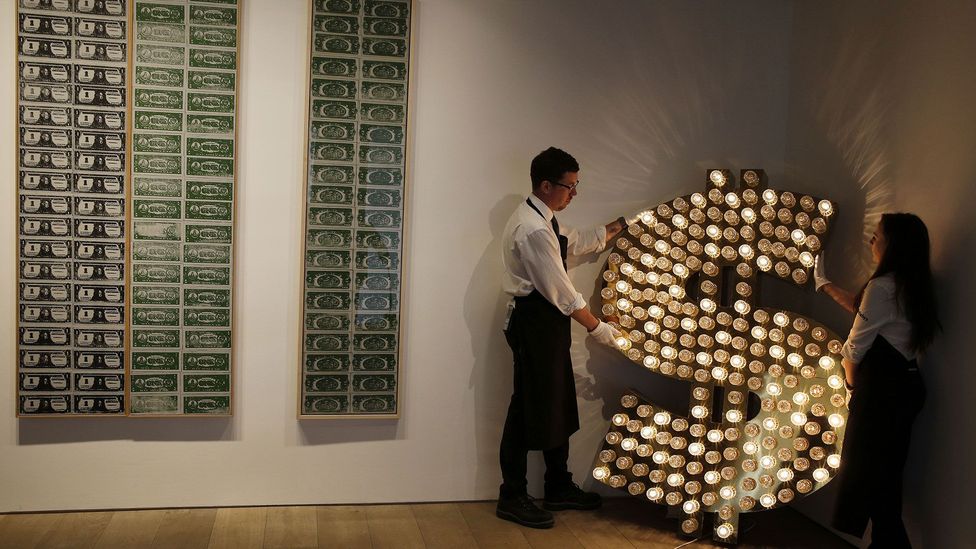
Could cash indefinite day solitary be establish in museums or galleries? (Credit: Getty Images)
On the far side creating new bills with advanced security features, others are toying with the idea of slapping the digital humankind right on top of the physical one. In 2001 the European Trades union considered adding an RFID cow dung to each greenback, largely in reply to a Brobdingnagian number of counterfeit euros unconcealed in Greece. They in the end rejected the idea, as it would increase the be of producing bills dramatically, but according to Christin, future money might be full of these kinds of digital elements. In point of fact, it's non the technology that's absent, Christin says, it's the infrastructure. An RFID chip is only useful if person has an RFID reader to scan IT with. "Intend about the guy on the beach in Thailand who wants to lease a surfboard," says Christin. "Serve you accept all the base you take to use that technology in that respect?"
"Information technology's not that the technology doesn't exist," He adds, "IT does, it would just cost a dish out of money and be hard to deploy universally." In past words, the exact challenges that face off digital currencies are what make digital additions to cash so herculean.
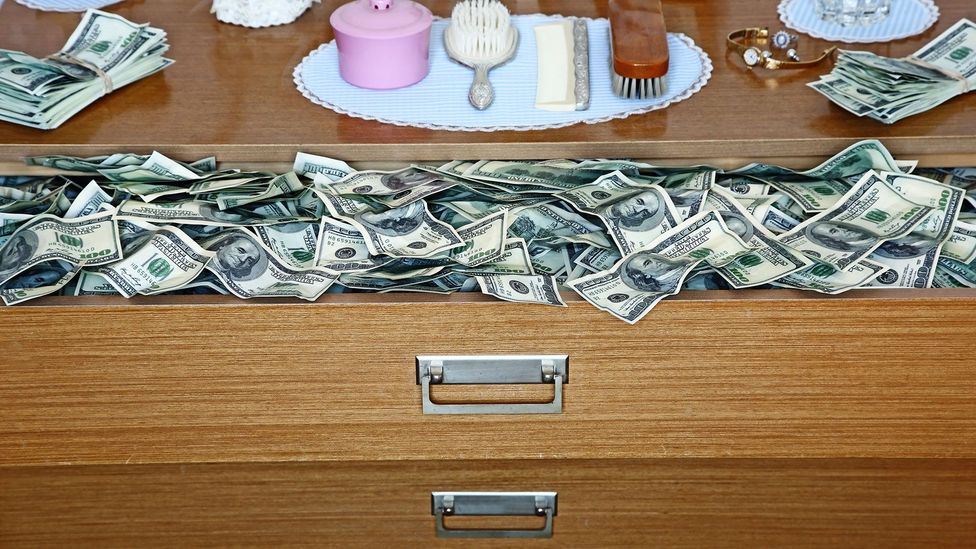
How much cash ut you take in stored in your home? (Recognition: Getty Images)
And so where does that result us? "Until we take in sufficient and reliable alternatives in situ, IT would be dumb to get free of immediate payment in real time," says David Wolman, author of the book The End of Money. "Honest people and legit businesses motionless rely on that." Instead of continuous cheering Oregon hand wringing about the word "cashless," people should be examining the trends that are pushing cash gone. "It would be foolish to conflate enthusiasm about the bear upon of that marginalisation with unthinking cheerleading for cash's total demise," he says.
Many World Health Organization think out about cash like to use Mark Twain's quote: "reports of my death have been immoderate." In one paper, the authors comparison Johnny Cash to a kind of Cinderella. "It doesn't have a mom or dad to watch over it – antimonopoly those horrible stepsisters that try to convince Cinderella that she is horrible. But she isn't," they write. Cash is with us, and it will stay with us whether Bitcoin and PayPal advocates similar it Oregon non.
Along that fall day in 2025 you may take a self-impulsive car to work, OR holograph into the office, and you may not even touch a art object of folding money. But you'll likely withal have a hardly a notes and coins on hand someplace, just in case. And you behind be certain that somewhere in the world, person is pulling cash out of their pocket to buy something.
Follow USAon Facebook , Twitter , Google+ and LinkedIn
How Can Dependents Of A Decedent Continue To Have Money To Live?
Source: https://www.bbc.com/future/article/20150724-the-truth-about-the-death-of-cash
Posted by: romriellsignatich.blogspot.com

0 Response to "How Can Dependents Of A Decedent Continue To Have Money To Live?"
Post a Comment